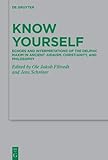Know Yourself : Echoes and Interpretations of the Delphic Maxim in Ancient Judaism, Christianity, and Philosophy / ed. by Ole Jakob Filtvedt, Jens Schröter.
Material type: TextSeries: Beihefte zur Zeitschrift für die neutestamentliche Wissenschaft ; 260Publisher: Berlin ; Boston : De Gruyter, [2023]Copyright date: ©2024Description: 1 online resource (IX, 634 p.)Content type:
TextSeries: Beihefte zur Zeitschrift für die neutestamentliche Wissenschaft ; 260Publisher: Berlin ; Boston : De Gruyter, [2023]Copyright date: ©2024Description: 1 online resource (IX, 634 p.)Content type: - 9783111083544
- 9783111084022
- 9783111083858
- 100
- online - DeGruyter
- Issued also in print.
| Item type | Current library | Call number | URL | Status | Notes | Barcode | |
|---|---|---|---|---|---|---|---|
 eBook
eBook
|
Biblioteca "Angelicum" Pont. Univ. S.Tommaso d'Aquino Nuvola online | online - DeGruyter (Browse shelf(Opens below)) | Online access | Not for loan (Accesso limitato) | Accesso per gli utenti autorizzati / Access for authorized users | (dgr)9783111083858 |
Frontmatter -- Foreword -- Contents -- Part 1: Introductory Chapters -- The Delphic Maxim Interpreted: Aims, Scope, and Significance of the Present Study -- Ancient Self-Knowledge: Exploring Some of the Scholarly Debates -- Interpretations and Echoes of the Delphic Maxim in Pre-Christian Greek Philosophy -- “Know Your Text”: the Integrity and Interpretation of Alcibiades m. 133c8–17 -- Part 2: Main Chapters -- Philo of Alexandria and the Transitory and Apophatic Dimensions of Knowing Oneself -- Seneca: Knowledge of Self and Nature -- Plutarch: Know God and Know Yourself -- Know Your Exceptionality. The Delphic Maxim Know Yourself in Epictetus -- Between Self-Knowledge and Self-Enjoyment: ΓΝѠθΙ ϹAYTON in the Skeleton Mosaic from beneath the Monastery of San Gregorio -- Self-Knowledge as Alienation and Unification in the Hermetica -- Self-Knowledge and the Hidden Kingdom: The Delphic Maxim in the Manuscripts of Gos. Thom. 3 -- What does it Mean to be Human? The Delphic Maxim in Irenaeus -- Know Yourself in Clement of Alexandria: Self-Knowledge, God-Knowledge and the Transformation of Self -- When Mortals Become Sinners: Tertullian Grappling with the Delphic Maxim -- A Maxim of Greek Philosophy Found in Scripture: “Know Yourself” in Origen and Reflections in Gregory of Nyssa -- Jesus Knowing Himself: Origen and the Gospel of John -- Plotinus on the Delphic Maxim: Knowing and Being One’s True Self -- Knowing Yourself as an Essential Part of Origen’s Teaching According to Gregory Thaumaturgus -- Forged in the Community of Divine Love: Augustine’s Quest through the Maxim of Self-Knowledge for Finite Wholeness within the Infinite God -- Author Index -- Index of biblical and classical sources
restricted access online access with authorization star
http://purl.org/coar/access_right/c_16ec
The book explores ancient interpretations and usages of the famous Delphic maxim “know yourself”. The primary emphasis is on Jewish, Christian and Greco-Roman sources from the first four centuries CE. The individual contributions examine both direct "ations of the maxim as well as more distant echoes. Most of the sources included in the book have never previously been studied in any detail with a view to their use and interpretation of the Delphic maxim. Thus, the book contributes significantly to the origin and different interpretations of the maxim in antiquity as well as to its reception history in ancient philosophical and theological discourses. The chapters of the book are linked to each other by numerous cross-references which makes it possible to compare the different views of the maxim with each other. It also helps readers to notice relationships and trajectories within the material. The explorations of the relevant sources are also set in the context of ongoing debates about the shape and nature of ancient conceptions of self and self-knowledge. The book thus demonstrates the wide variety of philosophical and theological approaches in that the injunction to know oneself could be viewed and how these interpretations provide windows into ancient discourses about self and self-knowledge.
Issued also in print.
Mode of access: Internet via World Wide Web.
In English.
Description based on online resource; title from PDF title page (publisher's Web site, viewed 26. Apr 2024)


